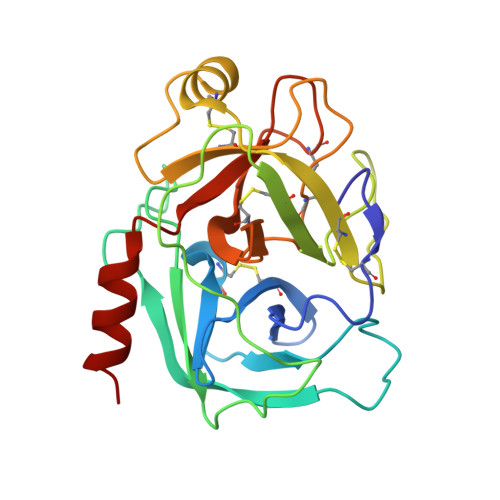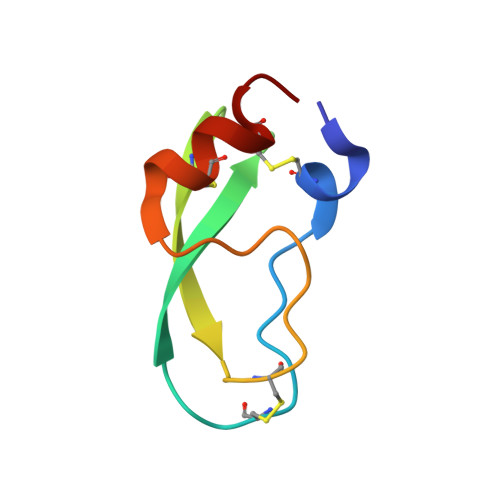Structural Basis for Accelerated Cleavage of Bovine Pancreatic Trypsin Inhibitor (BPTI) by Human Mesotrypsin.
Salameh, M.A., Soares, A.S., Hockla, A., Radisky, E.S.(2008) J Biological Chem 283: 4115-4123
- PubMed: 18077447
- DOI: https://doi.org/10.1074/jbc.M708268200
- Primary Citation of Related Structures:
2R9P, 2RA3 - PubMed Abstract:
Human mesotrypsin is an isoform of trypsin that displays unusual resistance to polypeptide trypsin inhibitors and has been observed to cleave several such inhibitors as substrates. Whereas substitution of arginine for the highly conserved glycine 193 in the trypsin active site has been implicated as a critical factor in the inhibitor resistance of mesotrypsin, how this substitution leads to accelerated inhibitor cleavage is not clear. Bovine pancreatic trypsin inhibitor (BPTI) forms an extremely stable and cleavage-resistant complex with trypsin, and thus provides a rigorous challenge of mesotrypsin catalytic activity toward polypeptide inhibitors. Here, we report kinetic constants for mesotrypsin and the highly homologous (but inhibitor sensitive) human cationic trypsin, describing inhibition by, and cleavage of BPTI, as well as crystal structures of the mesotrypsin-BPTI and human cationic trypsin-BPTI complexes. We find that mesotrypsin cleaves BPTI with a rate constant accelerated 350-fold over that of human cationic trypsin and 150,000-fold over that of bovine trypsin. From the crystal structures, we see that small conformational adjustments limited to several side chains enable mesotrypsin-BPTI complex formation, surmounting the predicted steric clash introduced by Arg-193. Our results show that the mesotrypsin-BPTI interface favors catalysis through (a) electrostatic repulsion between the closely spaced mesotrypsin Arg-193 and BPTI Arg-17, and (b) elimination of two hydrogen bonds between the enzyme and the amine leaving group portion of BPTI. Our model predicts that these deleterious interactions accelerate leaving group dissociation and deacylation.
- Department of Cancer Biology, Mayo Clinic Cancer Center, Jacksonville, Florida 32224, USA.
Organizational Affiliation:


















